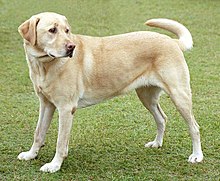狗
Translingual
| Stroke order | |||
|---|---|---|---|
| Stroke order | |||
|---|---|---|---|

| |||
Han character
狗 (Kangxi radical 94, 犬+5, 8 strokes, cangjie input 大竹心口 (KHPR), four-corner 47220, composition ⿰犭句)
Derived characters
References
- Kangxi Dictionary: page 709, character 12
- Dai Kanwa Jiten: character 20345
- Dae Jaweon: page 1121, character 22
- Hanyu Da Zidian (first edition): volume 2, page 1341, character 5
- Unihan data for U+72D7
Chinese
| simp. and trad. |
狗 | |
|---|---|---|
| alternative forms | 豿 “cub” | |
Glyph origin
| Historical forms of the character 狗 | ||
|---|---|---|
| Warring States | Shuowen Jiezi (compiled in Han) | Liushutong (compiled in Ming) |
| Chu slip and silk script | Small seal script | Transcribed ancient scripts |

|

|

|
| Old Chinese | |
|---|---|
| 勾 | *koː, *koːs |
| 鉤 | *koː |
| 鴝 | *koː, *ɡo |
| 句 | *koː, *koːs, *kos, *ɡo |
| 夠 | *koː, *koːs, *kʰoː |
| 枸 | *koː, *koːʔ, *koʔ |
| 軥 | *koː, *koːs, *ɡo |
| 狗 | *koːʔ |
| 苟 | *koːʔ |
| 岣 | *koːʔ, *ko |
| 笱 | *koːʔ |
| 玽 | *koːʔ |
| 耇 | *koːʔ |
| 豿 | *koːʔ, *qʰroːɡ |
| 敂 | *koːʔ |
| 怐 | *koːs, *kʰoːs, *qʰoːs, *kos |
| 雊 | *koːs |
| 竘 | *kʰoːʔ, *kʰoʔ |
| 齁 | *qʰoː |
| 呴 | *qʰoːʔ, *qʰos |
| 蚼 | *qʰoːʔ, *ɡo |
| 豞 | *qʰoːs |
| 訽 | *qʰoːs, *ɡoːs |
| 佝 | *qʰoːs |
| 拘 | *ko |
| 駒 | *ko |
| 眗 | *ko |
| 跔 | *ko |
| 鮈 | *ko |
| 痀 | *ko |
| 蒟 | *koʔ, *kos |
| 絇 | *kos, *ɡo |
| 邭 | *kos |
| 劬 | *ɡo |
| 朐 | *ɡo |
| 鼩 | *ɡo |
| 斪 | *ɡo |
| 翑 | *ɡo |
| 葋 | *ɡo |
| 姁 | *ɡo, *qʰo, *qʰoʔ, *qʰos |
| 欨 | *qʰo, *qʰoʔ |
| 喣 | *qʰoʔ |
| 煦 | *qʰoʔ, *qʰos |
| 昫 | *qʰos |
Phono-semantic compound (形聲/形声, OC *koːʔ) : semantic 犬 (“dog”) + phonetic 句 (OC *koː, *koːs, *kos, *ɡo).
Etymology
From some language ancestral to modern Hmong-Mien languages, from Proto-Hmong-Mien *qluwˣ (“dog”), perhaps from Proto-Austronesian *(u-)(ŋ)kuɣkuɣ (“dog”) (Norman, 1988; Benedict, 1996).
Alternatively, STEDT derives this from Proto-Sino-Tibetan *d-kʷəj-n (“dog”), whence also 犬 (OC *kʰʷeːnʔ).
Less likely, it may be related to 駒 (OC *ko, “foal”), 羔 (OC *kluː, “lamb”), 𤘽 (“calf”) (Wang, 1982).
Pronunciation
Lua error in Module:wuu-pron at line 162: Incorrect tone notation "2" for sh. See WT:AZH/Wu.
Definitions

- dog (Classifier: 隻/只 m c; 條/条 m)
- Used as a derogatory expression.
- (derogatory) despicable; nasty
- 狗男女 ― gǒu nánnǚ ― couple in an illicit love affair
- (chiefly Beijing Mandarin) to flatter
- (Hong Kong, slang, derogatory) police; pig
- † cub; young bear or tiger
- a surname
Synonyms
- (Hong Kong: police): 警犬 (jǐngquǎn)
Compounds
Lua error in Module:zh/templates at line 32: This template has been deprecated. Please use Template:col3 instead.
Descendants
References
- “Entry #4345”, in 教育部臺灣台語常用詞辭典 [Dictionary of Frequently-Used Taiwan Minnan] (overall work in Mandarin and Hokkien), Ministry of Education, R.O.C., 2024.
- Peyraube, Alain. "Ancient Chinese." The Cambridge Encyclopedia of the World's Ancient Languages. Ed. Roger D. Woodard. Cambridge UP, 2004. 1012.
Japanese
Kanji
Readings
Compounds
References
| Kanji in this term |
|---|
| 狗 |
| いぬ Hyōgai |
| kun'yomi |
Noun
- Alternative spelling of 犬
Korean
Hanja
- This term needs a translation to English. Please help out and add a translation, then remove the text
{{rfdef}}.
Vietnamese
Han character
狗: Hán Việt readings: cẩu (
狗: Nôm readings: cẩu[1][3][5]
- This term needs a translation to English. Please help out and add a translation, then remove the text
{{rfdef}}.
Compounds
References
- Translingual lemmas
- Translingual symbols
- Han script characters
- Han phono-semantic compounds
- Chinese terms derived from Proto-Hmong-Mien
- Chinese terms derived from Proto-Austronesian
- Chinese terms inherited from Proto-Sino-Tibetan
- Chinese terms derived from Proto-Sino-Tibetan
- Chinese lemmas
- Chinese hanzi
- Chinese nouns classified by 隻/只
- Chinese nouns classified by 條/条
- Mandarin terms with usage examples
- Mandarin terms with quotations
- Chinese derogatory terms
- Beijing Mandarin
- Hong Kong Chinese
- Chinese slang
- Cantonese terms with quotations
- Chinese terms with obsolete senses
- Chinese surnames
- zh:Dogs
- zh:Mammals
- Elementary Mandarin
- Japanese kanji
- Japanese hyōgai kanji
- Japanese kanji with goon reading く
- Japanese kanji with kan'on reading こう
- Japanese kanji with kun reading いぬ
- Japanese terms spelled with 狗 read as いぬ
- Japanese terms read with kun'yomi
- Japanese lemmas
- Japanese nouns
- Japanese terms with multiple readings
- Japanese terms spelled with hyōgai kanji
- Japanese terms with 1 kanji
- Japanese terms spelled with 狗
- Japanese single-kanji terms
- ja:Dogs
- Korean lemmas
- Korean hanja
- Vietnamese Chữ Hán
- Vietnamese lemmas
- Vietnamese Han characters
- Vietnamese Nom